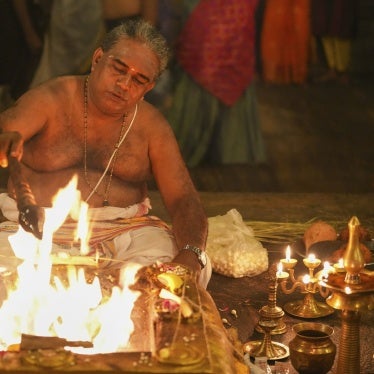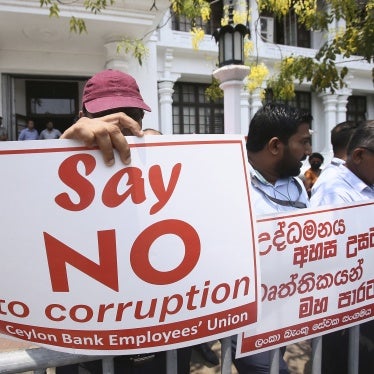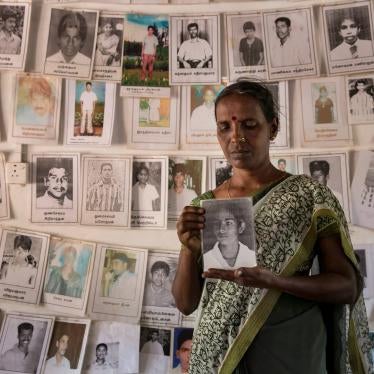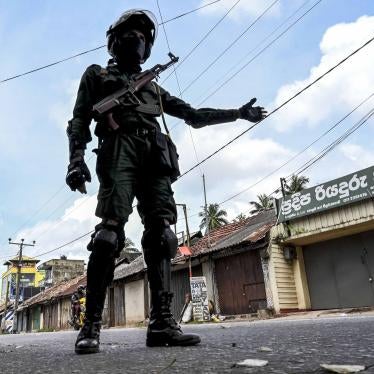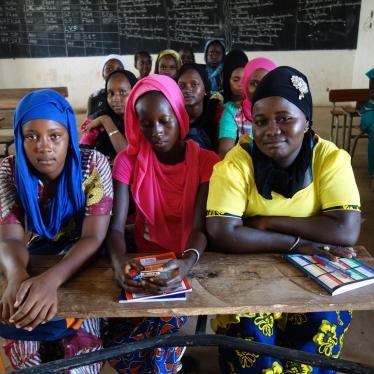Mr. Chairman,
Thank you for providing Human Rights Watch with the opportunity to testify today.
More than nine years after the end of the country’s brutal civil war and the defeat of the separatist Liberation Tigers of Tamil Eelam (LTTE), the people of Sri Lanka are still struggling to rebuild their country’s democratic institutions and obtain justice for crimes committed during the conflict.
The previous government of Mahinda Rajapaksa, in power when the war ended, repeatedly denied that any investigations of wartime abuses were warranted. Only after President Maithripala Sirisena was elected in 2015 did the government begin to make more serious efforts to address past abuses. Intense pressure from minority Tamil and Muslim communities and local activists, as well as strong pressure from concerned countries, including the United States, helped convince the government to engage with the United Nations Human Rights Council and begin setting up mechanisms to investigate and prosecute past crimes by all parties to the conflict.
The LTTE committed horrifying abuses during the conflict – carrying out sectarian massacres and political assassinations, executing detainees, conducting suicide bombings against civilians, using child soldiers, and even terrorizing ethnic Tamils under their control to extort money for their military operations.
The Sri Lankan security forces committed countless arbitrary detentions, extrajudicial killings, and enforced disappearances, and often brutally tortured detainees in their custody. The abuses the military committed in the final months of the fighting were especially egregious. The army indiscriminately shelled civilians being used as human shields by the LTTE. Videos emerged at the war’s end of soldiers summarily executing prisoners and jeering over the bodies of women combatants whom they had stripped, possibly raped, and murdered. Several LTTE leaders were seen on video surrendering to government forces but later were found shot and killed. Many LTTE fighters and other Tamil men who surrendered to the army at war’s end are still missing, most presumably executed.
Today, despite the promises of the Sirisena government, justice for these crimes, and answers about the fate of those forcibly disappeared, remain elusive. With respect to the LTTE, most of its
leadership was wiped out during the final weeks of the conflict, and there are few who can be held accountable for their atrocities today. On the government side, the steps taken have been too few and taken too slowly.
Since 2015, two separate resolutions at the UN Human Rights Council have passed by consensus with Sri Lanka’s consent, affirming a commitment by the government for four transitional justice mechanisms: a special court for alleged war crimes, a reparations tribunal to provide victims and survivors potential restitution, an office for missing persons to investigate disappeared persons, and a truth and reconciliation office.
As of 2018, the office of missing persons is the only entity of these four that the government has established. It has begun to hold hearings in various parts of the country. But work has been slow, and it has yet to issue any public reports, and many families of the disappeared remain in the dark about the fate of their family members.
For relatives of the disappeared, it has been too many long years of waiting. Some families have held outdoor vigils continuously for over a year seeking answers, despite declarations from the president and prime minister that all the missing are dead. For our staff who visit these vigils, and who have worked to document abuses and disappearances, it is painful to observe the wives or parents living, eating, and sleeping outside, on thatch mattresses under small canopies, waiting for answers that aren’t coming. But, of course that is nothing compared to the pain of these families, deprived even of information about the fate of their loved ones.
On reparations, progress has similarly been slow. The cabinet recently adopted a bill to provide reparations to certain persons effected by the conflict, but many fear payments will later be used as a justification for not addressing other issues, from missing persons to the need for investigations of war crimes. As for truth and reconciliation legislation, it remains stalled.
Most detrimental for Sri Lanka’s long-term stability, no real progress has been made on creating a special court to investigate and prosecute wartime crimes. Despite pledges by the government to undertake this key step, the president and prime minister have both publicly stated that “war heroes” will not be tried for their abuses.
A court with participation by foreign judges and legal experts was specifically promised in the 2015 Human Rights Council resolution, so the lack of progress will only serve to disillusion victim families. Many victims and survivors have told Human Rights Watch that they won’t accept reparations unless they start seeing real progress on justice and accountability. The debate over accountability is also likely to have political ramifications as the parties vie for popular support. Among those who may run in the next election is the former president’s brother and former defense secretary, Gotabaya Rajapaksa, a dual US-Sri Lanka citizen, who has been implicated in military abuses at the end of the war.
Sri Lanka’s human rights problems today extend beyond issues of justice and accountability. The draconian Prevention of Terrorism Act, which has long facilitated torture and other abuse, remains in effect. The government has also failed to initiate reforms to the security sector and criminal justice system, such as establishing accountability for police abuses or bringing criminal laws in line with international standards. Muslims and other religious minorities face ongoing threats and violence from ultra-nationalist Buddhist groups. I am including as an appendix to my written testimony a copy of Human Rights Watch’s 2018 World Report chapter on Sri Lanka, which discusses all of these issues in more detail.
What can the US government do about all of these problems?
First and foremost, US government officials, including members of Congress, should continue pressing Sri Lanka on the importance of addressing its human rights challenges. Tuesday’s announcement that the US will be leaving the UN Human Rights Council, over objections to some of its supposed procedural flaws and biases, will undermine efforts to improve human rights in many countries. It was the US government that led the council to put forward resolutions that are central to post-war efforts to achieve progress in Sri Lanka. Leaving the council is going to send a terrible message about the US government’s commitment to promoting human rights in general, and in Sri Lanka specifically.
Absent pressure from the UN, the US can, and should, use its leverage of financial assistance and military training to incentivize Sri Lanka to address human rights, justice, and accountability issues. Although US assistance to Sri Lanka is not extensive, it has been growing since the new government was elected in 2015, including in training for UN peacekeeping.
Existing legislation—and possibly new appropriations committee legislation in the Foreign Operations spending bill—impose conditions on some forms of assistance unless and until Sri Lanka carries out key steps on accountability and human rights reforms. We urge all members to retain and support these types of provisions in new appropriations legislation and also press the State Department and Pentagon to ensure that they communicate to the Sri Lankan government that US assistance will remain conditioned until Sri Lanka meets key benchmarks of reform.
Thank you again for allowing me to testify, and I look forward to answering any questions you may have.
Appendix: Human Rights Watch World Report 2018 – Sri Lanka
The general openness for media and civil society groups that emerged after the electoral defeat of the Mahinda Rajapaksa government in 2015 continued in 2017 under the administration of President Maithripala Sirisena. However, action stalled in 2017 on Sri Lanka’s October 2015 pledges to the United Nations Human Rights Council (UNHRC) to address accountability and political reconciliation emerging from the country’s 26-year civil war with the secessionist Liberation Tigers of Tamil Eelam (LTTE).
Despite a presidential pledge to release names of people in government custody, particularly those forcibly disappeared since the war’s final months in 2009, the list was not produced. The government enacted a law to give effect to the International Convention for the Protection of All Persons from Enforced Disappearance, but made clear that the law would not be retroactive.
Religious minorities remained at risk. In June 2017, then Justice Minister Wijeyadasa Rajapakshe publicly threatened a lawyer who criticized the government’s failure to protect minorities. In September, authorities took 31 Rohingya Muslim refugees into protective custody following threats by Buddhist extremists. There were further flares of violence in Galle and Vavuniya in November between Muslim and other communities, with allegations of mobs attacking Muslim homes and businesses.
Truth, Reconciliation, and Accountability for Past Abuses
In October 2015, the UNHRC adopted a consensus resolution in which Sri Lanka pledged to undertake several human rights reforms, including transitional justice demands arising from the civil war, and to establish four transitional justice mechanisms, including a judicial mechanism with “participation of international judges, prosecutors, lawyers and investigators” with an independent investigative and prosecutorial body.
Civil society leaders, appointed by the government, conducted nationwide consultations in 2016, and handed a comprehensive report to the government in January 2017. It contained strong recommendations, including for a hybrid justice mechanism, acknowledging the need for independent international participation to ensure justice for victims of war crimes and other grave human rights abuses by all sides. The report included the need for justice for all victims of the long conflict, regardless of ethnicity, religion, or political persuasion.
Neither the president nor the prime minister received the report publicly and it has since languished, with scant government attention. The government’s response to the report since January 2017 has also been disappointing. Senior cabinet ministers explicitly rejected the recommendation that foreign nationals participate in the special court. Both the president and the prime minister publicly reiterated the point, and further emphasized that the government would not allow “war heroes” to be prosecuted.
Enforced Disappearances
One of the four pillars of the 2015 resolution was to create an Office of Missing Persons (OMP). Although the government enacted a law in August 2016, efforts operationalize it remained stalled until September 2017. The OMP had yet to be formally set up at time of writing, and as of November, commissioners to the OMP had not been appointed.
Families of the disappeared said that the OMP was decided without proper consultation with affected groups, particularly as it was passed before the national consultation was finished. The act therefore does not address some of its central recommendations, including the need for psychosocial support, victim and witness protection measures, a minority rights commission, and symbolic gestures to allow public grieving, such as commemorating their dead.
The government failed to properly implement promised security sector reforms to ensure human rights protections. It failed to repeal or revise the draconian Prevention of Terrorism Act (PTA) and reform the Witness and Victim Protection Law. At least two separate drafts of the PTA were floated throughout the year, both of which could facilitate serious human rights abuses. Troubling provisions included overly broad definitions of terrorist offenses to possibly include peaceful political protesters. The government received feedback on the drafts from various UN offices specializing in counterterrorism, but at time of writing the drafts continued to fail international standards.
Lack of Accountability
With a few exceptions, particularly in cases that generated considerable publicity, Sri Lankan police were not held accountable for routine torture and ill-treatment in custody.
In April-May 2016, the UN special rapporteur on torture visited Sri Lanka. The report, presented to the March 2017 Human Rights Council session expressed “extreme alarm” at the failure to investigate credible allegations of torture, and corroborated accounts of ongoing torture, including sexual abuse.
The UN special rapporteur on counterterrorism and human rights, following a visit in July 2017, similarly reported that use of torture by Sri Lankan security forces is routine, and continues despite government claims of security sector reforms.
The National Human Rights Commission, although limited in resources, actively visited and monitored prisons and places of detention throughout 2017; despite occasional difficulties, the commission experienced no obstacles securing access to detainees.
Constitutional Reform
The government issued an interim report in September 2017, but it did not properly reflect recommendations from a 2016 national consultation. Nonetheless, its publication was welcomed by many political parties keen to see progress on constitutional reforms. However, the efforts stalled and parliament had yet to debate the report at time of writing. Nor had the government issued timelines for when a final report on constitutional reform could be expected.
Migrant Workers
The government took some steps to protect the rights of more than 1 million migrant workers in the Middle East and other parts of Asia, but many continued to face long working hours with little rest, delayed or unpaid wages, confinement in the workplace, and verbal, physical, and sexual abuse.
In June, the government announced the appointment of a committee to study strategies to reduce the number of domestic workers abroad and to end the kafala sponsorship system that operates in many Middle Eastern countries, restricting employment and transfer opportunities for migrant workers.
Sexual Orientation and Gender Identity
The government failed to make progress during the year toward implementing a 2016 plan forwarded by the Ministry of Health to establish a clear procedure for transgender people to change their identity documents. State and non-state discrimination against the lesbian, gay, bisexual, transgender and intersex (LGBTI) population persisted. Sections 365 and 365A of the penal code prohibit “carnal knowledge against the order of nature” and “gross indecency,” commonly understood in Sri Lanka to criminalize same-sex relations between consenting adults. At a UN review in November, Sri Lanka rejected recommendations to repeal sections 365 and 365A.
Women’s Rights
The UN Committee on the Elimination of Discrimination against Women (CEDAW) reviewed Sri Lanka in February 2017, noting in its concluding observations that the government had yet to fully implement the Convention on the Elimination of All Forms of Discrimination against Women, although it did note some progress on policies and plans designed to protect women against trafficking, and sexual and other violence.
Key International Actors
Sri Lanka continued its engagement with the international community. UN special mandate holders made several visits to the country during the year. Sri Lanka appeared before the UN Universal Periodic Review Working Group in November.
The government engaged with the Human Rights Council and the Office of the High Commission for Human Rights regularly throughout the year. The UN High Commissioner for Human Rights called on Sri Lanka for speedier and more meaningful implementation of its promises during the September 2017 council sessions.
The Sri Lankan government, in responding to the CEDAW in February, seemed unable or unwilling to answer questions of concern that committee members put to the government delegation.
The United Nations expressed an interest in vetting Sri Lankan forces before sending them abroad for peacekeeping duties in light of the numerous wartime abuses attributed to the armed forces.
